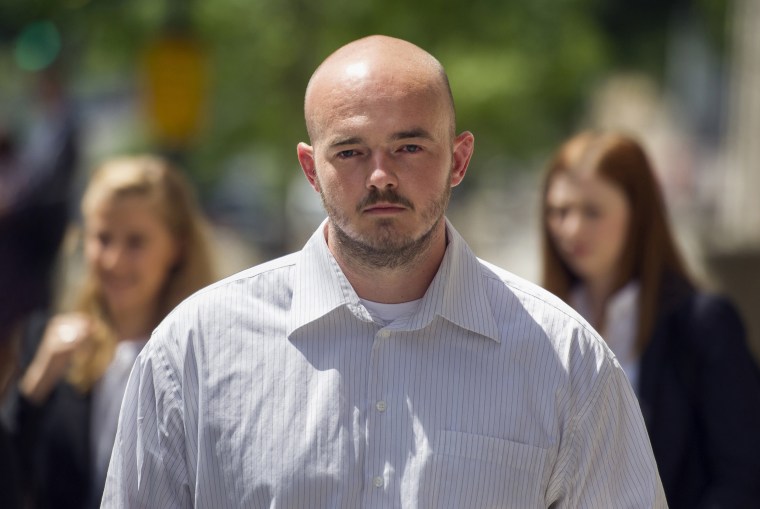Seven years ago, four former security guards sprayed a Baghdad traffic circle with bullets, shooting more than 30 Iraqis. Tuesday, in a Washington, D.C., courthouse nearly 6,200 miles away from that intersection, a jury begins to deliberate their fate.
Lawyers for the Blackwater Worldwide guards, working for the U.S. State Department, don't deny the men's involvement in the Sept. 16, 2007, shooting, but say they were acting in self-defense. Prosecutors have argued there is no evidence to support that.
"The U.S. military effort in Iraq was not popular with the Iraqi population, and security contractors were especially unpopular," said Stephen Biddle, adjunct senior fellow for defense policy at the Council on Foreign Relations and an international affairs professor at George Washington University. "There's lots of desire in Iraq among the public to see these guys prosecuted and punished."
After 10 weeks of trial, the case goes to the jury. Here is a look at the shooting, the trial, and what's at stake.
What happened at Nisoor Square in Baghdad in 2007?
A team of Blackwater contractors drove four armored trucks into the square, firing so much gunfire that "bloody, bullet-riddled corpses" were left strewn throughout the area, prosecutor Anthony Asuncion told a federal jury during the trial. Seventeen Iraqis were killed, including a 9-year-old boy whose brains fell out at his father's feet, the dad testified; about 20 others were injured. The incident, four years into the Iraq war, was met with international outrage.
Facts surrounding the case are murky. The guards, who were trying to clear a path for a State Department convoy to return to the Green Zone, contend a white Kia that appeared to be carrying a possible car bomb pulled out of traffic and was approaching the convoy. Their lawyers say insurgents fired on the convoy, unprovoked, prompting a justified response from the guards; prosecutors maintain there was never any incoming gunfire that prompted the guards to start shooting.
"In many parts of the world, the U.S. military action in Iraq was unpopular and viewed as illegitimate," Biddle said. "There are multiple underlying dynamics that tend to make Blackwater unpopular: You've got an unpopular occupation with a particular unpopular actor doing an unpopular thing."
How much prison time do the guards face?
An FBI investigation found at least 14 of the deaths to be unjustified and in violation of deadly force rules for security contractors in Iraq. Four guards — Nicholas Slatten, Paul Slough, Dustin Heard and Evan Liberty — are charged with 14 deaths and 18 non-fatal shootings. Slatten faces a first-degree murder charge for the killing of the Kia driver and could get up to life in prison if convicted. Slough, Heard and Liberty are charged with voluntary manslaughter, attempted manslaughter and gun charges. They face mandatory minimum sentences of 30 years in prison each if convicted on a gun charge and one other felony.

Prosecutors dropped charges against another contractor last year due to lack of evidence.
Throughout the trial, prosecutor Asuncion gave detailed accounts of Iraqis who were shot in the back as they tried to run from the barrage of gunfire, and told the jury that the guards "took something that didn't belong to them, the lives of 14 human beings." In response, defense lawyers asked jurors to focus on "witness after witness" who testified that there was incoming gunfire that day, presenting a threat to the convoy. AK-47 shell casings that the defense said were proof of shots from insurgents were found in the traffic circle; Asuncion balked at that.
"Shell casings on the streets of Baghdad are about as common as seashells at the beach," he told the jury.
What has the trial focused on?
Jurors have gotten an intimate look at a shooting that happened during the chaotic days of war. Prosecutors called more than 60 witnesses to the stand, many of whom recounted life-altering injuries they sustained, including one Iraqi who lifted up his clothes to reveal his injuries to the 12-member jury. In contrast, the defense brought forward just four witnesses — people who spoke of hearing AK-47 gunfire, used by insurgents, and radio logs indicating the convoy had been hit. But the defense also argued the scene had been tampered with.
"We will never know the extent to which Iraqi national police scrubbed the scene" of evidence that the guards were fired on, said Brian Heberlig, who represents Slough.
The jury, comprised of eight women and four men, includes several military veterans and U.S. government employees.
What's at stake diplomatically?
Now that the U.S. has recently gotten involved in Iraq again, fighting against terror group ISIS, the Blackwater trial comes in a delicate time in diplomatic relations.
"To the extent [the guards] don't get punished as aggressively as Iraqis would like, that tends to be equal to hurting relations," Biddle, of the Council on Foreign Relations, said. "The other side of the coin, though, is at the moment, Iraqis are very interested in getting assistance" against ISIS.
"The degree to which Iraqis are going to be willing to allow potential American military support to go away out of aggravation if this judgment doesn't go the way they want is not the same now as it would have been a year ago," he said.